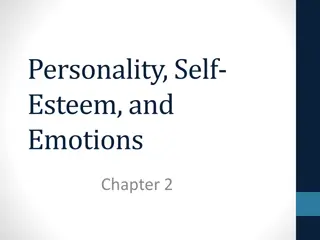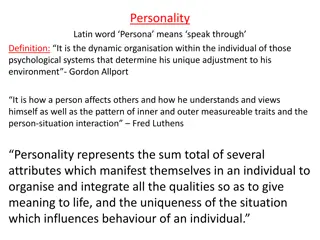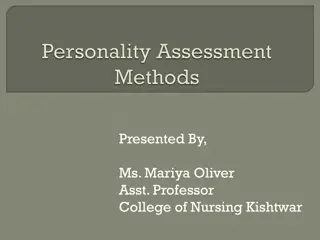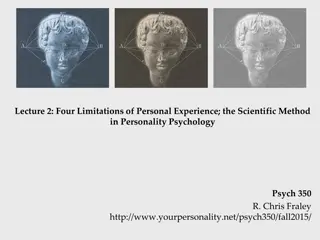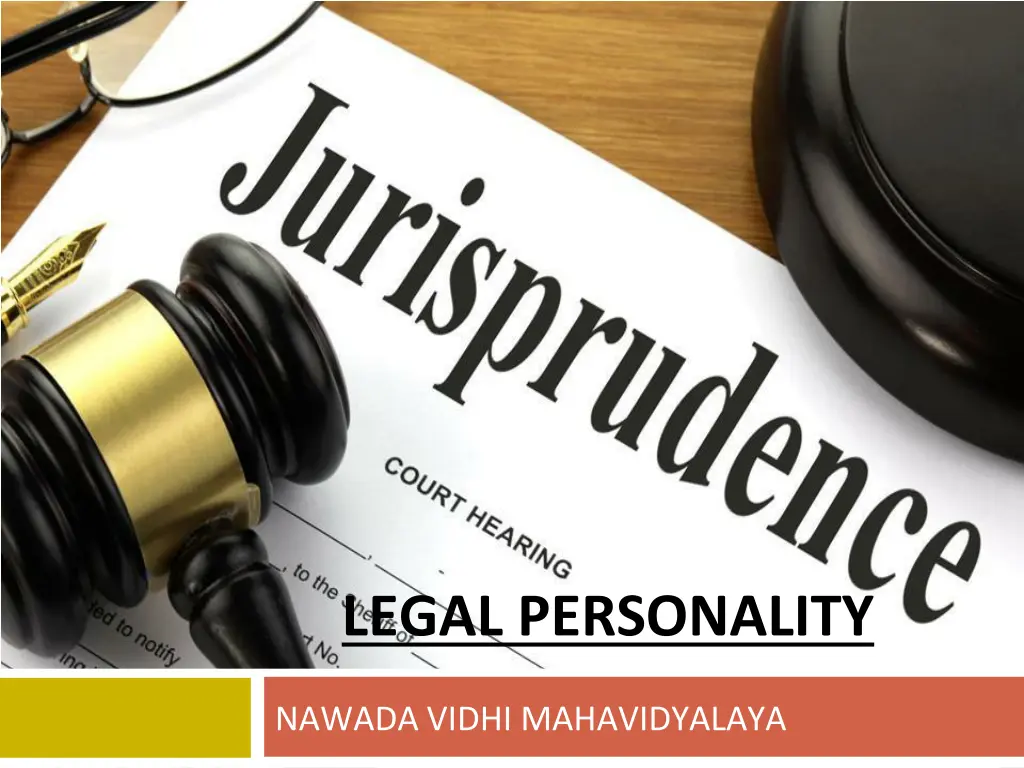
Understanding Legal Personality in Jurisprudence
Explore the concept of legal personality in law, including its definition, types (natural and artificial), and examples like corporations, government entities, and non-profit organizations. Discover how different entities are recognized as having legal rights and duties.
Uploaded on | 3 Views
Download Presentation

Please find below an Image/Link to download the presentation.
The content on the website is provided AS IS for your information and personal use only. It may not be sold, licensed, or shared on other websites without obtaining consent from the author. If you encounter any issues during the download, it is possible that the publisher has removed the file from their server.
You are allowed to download the files provided on this website for personal or commercial use, subject to the condition that they are used lawfully. All files are the property of their respective owners.
The content on the website is provided AS IS for your information and personal use only. It may not be sold, licensed, or shared on other websites without obtaining consent from the author.
E N D
Presentation Transcript
LEGAL PERSONALITY NAWADA VIDHI MAHAVIDYALAYA
literal Meaning of Legal Personality Word person is derived from the Latin word persona 'which means a mask used by actor in playing drama. Reason of mask is for uniformity. Capability of right and duty.
literal Meaning of Legal Personality The concept of "legal personality" is a cornerstone of jurisprudence, defining entities that the law recognizes as capable of possessing rights and duties. This elaboration delves into the meaning, types, and theories of legal personality.
Definition of legal Personality Salmond: Person as any being to whom the law regards as capable of rights and duties. Any being that is so capable, is a person whether human being or not and no being that is not so capable is person even through he be a man. Person are the substance of which rights and duties are the attributes G.W. Paton: Legal personality is medium through which some of such units are created in whom rights can be vested.
Type of legal personality Natural Person Artificial Person
Legal stems recognize various types of entities as possessing legal personality. These broadly include: Natural Persons: These are human beings who are recognized by law as having rights and duties from birth Artificial or Juristic Persons: These are entities, other than human beings, to whom the law attributes personality by fiction . This category is diverse and includes: Corporations: Legal entities, such as companies registered under the Companies Act, created to conduct business and treated as separate from their owners. Government Entities: Bodies established by law to perform governance and administrative functions, like municipal corporations and state boards. Non-Profit Organizations: Associations and societies, often governed by specific acts like the Societies Registration Act, 1860, in India, which have legal personality to conduct their activities . Other Entities: Depending on the legal system, other entities like idols or institutions might be granted legal personality.
Some illustrations of legal personality Legal status of unborn child. TPA& the Evidence Act Some condition in Mitakshra law, held that existence of unborn child as coparcener. i. ii. Legal status of Dead man. actio personalis moritur cum personaa (personal action dies with the person) Legal status of animal. Legal status of idol and mosque. Pramatha N. Mullick(PC) &Yogendra Nath Naskar V. Commissioner of Income Tax.(SC) i.
Property Rights Transfer of Property Act, 1882 (TPA): Section 13 of the TPA in India allows for the transfer of property for the benefit of an unborn person, with the property vesting in the child upon live birth. Hindu Succession Act, 1956: Section 20 stipulates that a child in the womb at the time of an intestate's death, if born alive, has the same right to inherit as if born before the intestate's death. Mitakshara Law: Under Mitakshara school of Hindu law, an unborn child is considered a coparcener and can claim a share in ancestral property if born alive.
Property Rights Constitutional and Criminal Law: Article 21 of the Indian Constitution, affirming the right to life and personal liberty, has been interpreted by courts to extend protection to unborn children. Sections 88- 92 of the Bhartiya Nyaya Samhita, 2023, also provide certain protection. Contingent Rights: It's important to note that the rights of an unborn child are generally contingent upon live birth.
Legal Status of a Dead Man Generally, upon death, a person's legal personality ceases to exist. The legal maxim "actio personalis moritur cum persona" signifies that a personal right of action dies with the person. However, the law does provide certain protections and recognitions concerning a deceased individual: Body: The law ensures a decent burial or handling of the deceased's body according to their wishes or prevailing customs . Reputation: Defamation of a deceased person can, in some instances, be actionable if it harms the reputation of their living relatives. Estate/Property: The deceased's will, if any, is given effect, and their property is distributed according to succession laws . While criminal liability generally extinguishes with death, civil liabilities may sometimes be recoverable from the deceased's estate .
Legal Status of Animals In modern law, animals are generally not considered legal persons capable of holding rights and duties independently. They are typically viewed as property. Liability for Animal Actions: The owner or keeper of an animal is usually held responsible for damage or harm caused by the animal due to negligence . Animal Welfare: Modern legal systems increasingly recognize the need to protect animals from cruelty. India, for instance, has laws like the Prevention of Cruelty to Animals Act. The concept of "animal rights" is a growing field of legal and ethical discussion. Trusts for Animals: A charitable public trust for the benefit of a class of animals (not an individual animal) may be considered valid and enforceable.
Legal Status of Idols and Mosques In Indian law, Hindu idols have been recognized as juristic persons, capable of holding property and being involved in legal proceedings through their designated guardians or shebaits. Landmark Cases: Pramatha Nath Mullick v. Pradymumna Kumar Mullick: The Privy Council held that an idol is a legal person and has the right to have its location respected. A disinterested next friend can represent it in court. Yogendra Nath Naskar v. Commissioner of Income Tax: The Supreme Court of India upheld that if an idol can hold property, it can also be subject to taxes, further cementing its status as a separate juridical entity. Mosques: The legal status of mosques as juristic persons has seen more varied judicial opinions. While some courts have held them to be separate entities, the Privy Council, in some instances, has opined otherwise, suggesting they cannot be sued as separate legal beings. This area may be subject to ongoing interpretation.
Corporate Personality Type of corporate personality. Corporation aggregate Corporation aggregate may be created by Royal charter Special statute or enactment. By registration under the company Act Soloman v/s Soloman and Co. Ltd (1897) AC 22 at 51. Dalmer Co. Ltd v/s Continental tyre and Rubber Co. Ltd. (1916) 2 AC 307. i. ii. iii. Corporation sole Crown of England Indian Situation Civil and criminal liability of corporation.
Landmark Cases Establishing Corporate Personality: Salomon v. Salomon & Co. Ltd. (1897): This House of Lords case is a foundational judgment that firmly established the principle of separate legal personality for companies, even for small, closely-held businesses. The court held that once a company is legally incorporated, it is an entity distinct from its shareholders, and the shareholders are not personally liable for the company's debts beyond their investment. Daimler Co. Ltd. v. Continental Tyre and Rubber Co. (Great Britain) Ltd. (1916): This case dealt with the concept of "enemy character" of a company during wartime. The House of Lords held that while a company is a separate legal entity, its character (e.g., as an "enemy" company) could be determined by the character of those who controlled it (directors and shareholders). This case is an example where the "corporate veil" (the separation between the company and its members) can be lifted in exceptional circumstances, such as national security.
Indian Situation In India, corporate personality is well-recognized, primarily governed by the Companies Act, 2013. Corporations are treated as separate legal entities with rights to own property, enter contracts, and sue or be sued in their own name. Civil and Criminal Liability of Corporations Since corporations are legal persons, they can incur both civil and criminal liability. Civil Liability: Corporations can be held liable for breach of contract, torts committed by their employees in the course of employment (vicarious liability), and other civil wrongs. Criminal Liability: Historically, it was debated whether corporations could be held criminally liable, especially for offenses requiring mens rea (a guilty mind). However, modern jurisprudence, including in India, has evolved to hold corporations criminally liable for various offenses. This can be through specific statutory provisions or by attributing the mental state of key managerial personnel to the corporation (identification theory). Books and legal resources discuss the complexities of corporate criminal liability, including issues like sentencing and the circumstances under which the "corporate veil" might be lifted to hold individuals within the company responsible .
Theories of corporate personality Fiction theory ( Savigny, Salmond, Holland) Realistic theory (Johannes Althusious, Gierke in Germany and Maitland in England). Concession theory ( Savigny, Salmond and Dicey) Bracket theory (Ihering) Purpose theory ( Brinz) in England Barker
Theories of corporate personality Several theories attempt to explain the nature of corporate personality: 1. Fiction Theory: Proponents: Savigny, Salmond, Holland. Concept: This theory posits that the legal personality of entities other than human beings is a mere fiction created by the law. The corporation is an artificial person, granted personality by the state. The Salomon v. Salomon case is often cited as supporting this theory in English law. 2. Realist Theory: Proponents: Johannes Althusius, Gierke (Germany), Maitland (England). Concept: This theory views a corporation as a real entity with an existence independent of its members, not just a legal fiction. It suggests that the law merely recognizes an already existing social reality.
Theories of corporate personality Concession Theory: ? Proponents: Savigny, Salmond, Dicey. ? Concept: Similar to the fiction theory, this theory holds that corporate personality is a concession or grant from the state. The state, as sovereign, has the power to confer or withdraw legal personality. It focuses on the source of legal power. Bracket Theory (or Symbolist Theory): ? Proponent: Ihering. ? Concept: This theory suggests that the concept of corporate personality is essentially an economic device or a symbol used to simplify the coordination of legal relations among the individuals who form the corporation. It implies that the law can, when necessary, look behind the "bracket" of the corporate entity to the individuals involved.
Theories of corporate personality Purpose Theory (or Zweck Mogen Theory): ? Proponents: Brinz (Germany), Barker (England). ? Concept: This theory suggests that legal personality is granted to entities (other than humans) only to achieve certain specified purposes. The corporation is seen as a means to an end, existing to fulfill a particular purpose rather than having inherent rights. These theories offer different perspectives on why and how non-human entities are granted legal status, reflecting diverse philosophical and practical considerations in jurisprudence. This elaborated overview provides a comprehensive understanding of legal personality, its various facets, and its significance in the legal world.



